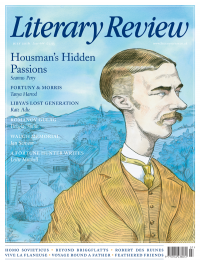Caroline Moorehead
Occupational Hazards
Les Parisiennes: How the Women of Paris Lived, Loved and Died in the 1940s
By Anne Sebba
Weidenfeld & Nicolson 457pp £20
In the spring of 1942, a French résistante called Cécile, forced to go underground in Paris on account of her activities, was asked by her mother how, since she was herself the mother of a young daughter, she could carry out this work. ‘It is precisely because I have a child that I do it,’ Cécile replied. ‘I do not want her to grow up in a world of occupation and collaboration.’ Les Parisiennes is full of stories of equally brave women, alongside those of women who collaborated with the Germans. It is said that a similar proportion of the population – some 10 per cent – became either active resisters or active collaborators during what became known as les Années Noires, with the rest simply carrying on, as best they could, their ordinary lives. Until 1938 women had only been allowed to work or own property with the permission of their fathers and husbands. As Anne Sebba shows, life for Parisian women was a deeply ambiguous affair. Their experiences, like a kaleidoscope, can be ‘turned in any number of ways to produce a different image’.
Parisians were first amazed and then reassured when the gleaming, well-fed, glossy German soldiers marched into their city on 14 June 1940. Expecting brutality and uncouthness, they found their occupiers polite and suave. As one woman put it, ‘after the agony of defeat a kind of euphoria reigned’. It was

Sign Up to our newsletter
Receive free articles, highlights from the archive, news, details of prizes, and much more.@Lit_Review
Follow Literary Review on Twitter
Twitter Feed
It wasn’t until 1825 that Pepys’s diary became available for the first time. How it was eventually decrypted and published is a story of subterfuge and duplicity.
Kate Loveman tells the tale.
Kate Loveman - Publishing Pepys
Kate Loveman: Publishing Pepys
literaryreview.co.uk
Arthur Christopher Benson was a pillar of the Edwardian establishment. He was supremely well connected. As his newly published diaries reveal, he was also riotously indiscreet.
Piers Brendon compares Benson’s journals to others from the 20th century.
Piers Brendon - Land of Dopes & Tories
Piers Brendon: Land of Dopes & Tories - The Benson Diaries: Selections from the Diary of Arthur Christopher Benson by Eamon Duffy & Ronald Hyam (edd)
literaryreview.co.uk
Of the siblings Gwen and Augustus John, it is Augustus who has commanded most attention from collectors and connoisseurs.
Was he really the finer artist, asks Tanya Harrod, or is it time Gwen emerged from her brother’s shadow?
Tanya Harrod - Cut from the Same Canvas
Tanya Harrod: Cut from the Same Canvas - Artists, Siblings, Visionaries: The Lives and Loves of Gwen and Augustus John by Judith Mackrell
literaryreview.co.uk